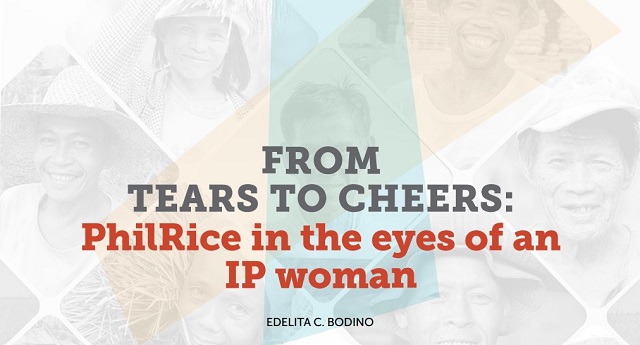
I am Edelita Bodino, 54 years old. I belong to the Agta-Tabangnon tribe in Danao, Polangui, Albay.
As so-called indigenous people (IP), we are known for planting rice and coconut on the mountain slopes. These rices we call Dinorado and Hinawa are cherished for their delicious taste. They are our community’s main staple food, but not our livelihood. We do not sell our rices. We only get cash from selling copra and weaving abaca footwears.
These colored rices have long been cultivated by our great grandparents up to my father, but it only took one strong typhoon to wash them out of our way of life. Our roof made of palm and coconut leaves was blown away. The rice seeds that we stored at home were soaked as a result. We did not have enough food, no seeds to plant, nor copra to sell because everything was destroyed. We were so devastated.
I do not remember anyone who came to help us then.
My husband decided to work in Manila because we almost had nothing. I remember crying so often over the misfortunes that happened.
After a few months, my husband could not earn enough money for our family’s needs. It was when I decided to also go to the big city and look for a job. I was hired as a housemaid in Bulacan. I left my children to my mother’s care. It was not yet time to receive my first salary but I asked my employer for an advanced payment because my kids back home didn’t have enough food.
After one year, my husband and I decided to return to Danao. We resolved to plant rice and sell copra again. It was not enough but at least we could get by, and our family was reunited and complete.
Help from outlanders
Sometime in 2016, I was told by a Katribu personnel (an office assigned for IPs) that someone from PhilRice was visiting. If not for that call, I would have hidden like we always do every time a stranger will enter our community. But because they asked permission from the office, I welcomed them.
We call her Ma’am Jing (Gina Nuñez of PhilRice Bicol). During our first meeting, she asked us if we would like to participate in their project. I said yes but I was quite nervous. It was our first time to be involved in such activities. Later on, we fully opened ourselves to their teachings because we were convinced with their sincerity and patience to us.
Although our barangay was 21km away from the center of Polangui, Ma’am Jing checked on us at least twice every week. They would either ride a car or rent a motorcycle. They taught us a lot, but the Palayamanan [System] was probably the most useful subject that they presented to us.
We had our seminars on Palayamanan and production of organic fertilizers at the Danao viewdeck. I was then the caretaker of the viewdeck so I asked our barangay captain to allow us to conduct seminars there for free. As it was for the constituents, he agreed. There were 30-40 of us who attended the seminars on rice and vegetables, with lectures and demonstrations combined.
Eventually, we all learned to plant various crops. There were tomatoes, eggplant, chili pepper, ampalaya, potatoes, bottle gourd, cucumber, watermelon, pechay, radish, and mustard.
They also said that there are beneficial and harmful organisms in the rice field. Ma’am Jing herself penetrated the fields to catch insects. Because of her enthusiasm, we did not hesitate to follow. However, because of lack of water resource, we could not push through with rice production. They also taught us how to produce organic fertilizers. My favorite was the mixture of sweet potato leaves and molasses.
They said it can be used to help plants produce more fruits. I like this because the ingredients came from our own plants, and there are no chemicals involved. It is safe for our land.
Income at last
The Palayamanan approach was amazing because it allowed us to earn money faster. I don’t exactly remember how much our household earned but I know that the project made an impact on us, like it did to our community members who consistently attended the activities. From the income we earned from vegetable and copra production, plus the income of my two children, we bought and raised 2 cows, 4 pigs, and a dozen of goats. From there, we had our house improved. Now, we need not bother collecting palm or coconut leaves because finally, the walls are concrete and our roof is made of galvanized iron sheets. I wish Ma’am Jing could come visit us again so she could see our house.
Aside from the income, I also learned to be more sociable to people especially to the non-natives. Needless to say, after Ma’am Jing’s team came here, other public agencies and entities began opening doors for us, too. We are now being assisted by our local government unit, and most, if not all of us are now beneficiaries of the Pantawid Pamilyang Pilipino Program of the Department of Social Welfare and Development.
This time of pandemic, our learnings became more relevant because we have enough source of food from our backyards. It’s just that we could not sell it to our neighbors because all of us can now produce our own vegetables. It is both funny and fine. At least we won’t be hungry again.
I will be forever grateful to PhilRice because of their compassion and patience to us, even if we are from the outskirts and are less educated. I thank the Lord because He led them to us. May the Almighty keep Ma’am Jing and the other PhilRice people safe always, especially during this time of COVID-19.




